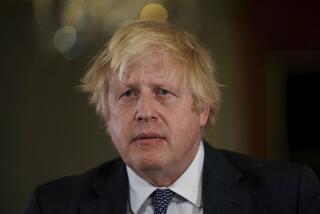COLUMN LEFT : Tory Instinct for Survival Gores Thatcher : Europe would be the brighter for her political passing.
- Share via
Margaret Thatcher faces overthrow at the hands of her own party because she finally became ridiculous and thus an irredeemable liability. Politicians everywhere have a well-honed instinct for survival, nowhere more so than in the British Conservative Party, which over the years has shown a pitiless skill in discharging baggage that has suddenly become burdensome. In one bout of emergency spring-cleaning the, task of firing many of his oldest friends so distressed the late Harold Macmillan, then prime minister, that he became physically sick. But this did not prevent him from swinging the ax, weeping as he did so. With the British upper classes it has been ever thus.
To these upper classes Thatcher brought the benefits of her populist coalition, not merely the massed ranks of the petty bourgeoisie from which she can trace her own social origins but also a useful slab of the working class. She was catering to their fervent brand of nationalism, which is also her own, when she recently isolated the United Kingdom by denouncing her European colleagues at a Common Market summit for speeding too rapidly toward economic and political union.
The all powerful British financial sector probably wouldn’t care if the Common Market decreed that the Union Jack had to be flown upside down. It has only genial contempt for Little Englander whimperings about the imperiled emblems of nationhood, like the banger and the pound. The banger had the humiliation a few years ago of being denied admission to the Continental mainland on the ground that being made of bread with a minute increment of gristle it could not properly be called a sausage. The pound is now in the clutches of the Ecu (the EC’s unit of currency), as shackled as Richard the Lionheart ever was in his Austrian prison.
It was too much for Thatcher and too much for her main journalistic ally, the Sun, a multimillion circulation political and sexual smut sheet owned by Rupert Murdoch. “UP YOURS DELORS” its front-page headline bellowed, referring to the French president of the European Commission, following with a list of 10 reasons to hate the French.
A few years ago it was the Labor Party, opposed to the Common Market, which was howling about the sanctity of sausages and kippers and other emblems of the ancient way. Now it’s Thatcher who is facing backwards, amid Labor’s hopes that she last long enough to drag her party down in the next election.
In Britain, as in the United States, the sky is now dark with chickens coming home to roost. The story is more or less the same, unsurprisingly so because Thatcher’s economic strategy launched in 1979 when she became prime minister was the same as Ronald Reagan’s in 1981: Throw lots of incentives at the rich in the form of lowered tax rates, deregulation, anti-labor legislation, erosion of the social safety net, etc., amid claims that the rich would become richer but so would the other 80% of the population. The first bit of the equation came to pass but not the second.
In Britain Thatcher dropped the top marginal tax rate from 83% to 40%. Executive salaries soared, but just as in the United States, there was no increase in real corporate investment as opposed to speculative raiding. As in the United States corporations are now top-heavy with debt and thus vulnerable to the recession, as credit dries up and bankers take a hard look at their loan portfolios.
Other claims for the Thatcher revolution are untrue. Beyond the undisputed fact that the ‘82-’83 recession reduced inflation and intimidated labor--the function of all recessions--Britain has not seen increases in productivity and its growth rate has expanded since 1979 only by an average of 2.2% a year, slower than the 2.4% achieved in the despised, highly taxed 1970s. This scrawny 2.2% rate came in the decade when North Sea oil came on-stream and commodity prices were low.
The Thatcher years have brought a 43% increase in the income of the top 10% whereas the bottom 40% have suffered a decline in income of up to 8%. The country is now a net importer of manufactured goods and is running an enormous deficit. But the damage is far more profound than even these figures would suggest.
Talking endlessly about “freedom” Thatcher significantly reduced civil liberties, always miserable in Britain. An entire generation has come of age knowing nothing of national leadership but her pinched authoritarianism and imbecilic catch phrases about the national destiny. Europe would be the brighter for her political passing, particularly since the Irish Republic can now boast a decent socialist president, Mary Robinson, and Norway a socialist prime minister, Gro Harlem Brundtland, both women augurs of a better European spirit for the 1990s than Thatcher’s vicious ideology.
More to Read
Sign up for Essential California
The most important California stories and recommendations in your inbox every morning.
You may occasionally receive promotional content from the Los Angeles Times.













